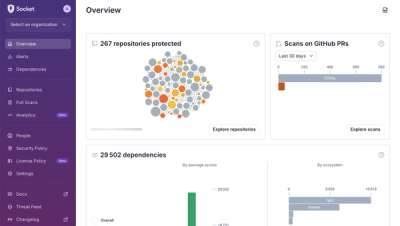
Research
wget to Wipeout: Malicious Go Modules Fetch Destructive Payload
Socket's research uncovers three dangerous Go modules that contain obfuscated disk-wiping malware, threatening complete data loss.
Vue Tour is a lightweight, simple and customizable tour plugin for use with Vue.js. It provides a quick and easy way to guide your users through your application.
Vue Tour is a lightweight, simple and customizable tour plugin for use with Vue.js. It provides a quick and easy way to guide your users through your application.
You can install vue-tour using npm or by downloading the minified build on GitHub.
npm install vue-tour
Then import the plugin in your application entry point (typically main.js if you used vue-cli to scaffold your project) and tell Vue to use it. Also don't forget to include the styles. You can add the styles provided by default or customize them to your own liking.
import Vue from 'vue'
import App from './App.vue'
import VueTour from 'vue-tour'
require('vue-tour/dist/vue-tour.css')
Vue.use(VueTour)
new Vue({
render: h => h(App)
}).$mount('#app')
Finally put a v-tour component in your template anywhere in your app (usually in App.vue) and pass it an array of steps.
The target property of each step can target a DOM element in any component of your app (as long as it exists in the DOM when the concerned step pops up).
<template>
<div>
<div id="v-step-0">A DOM element on your page. The first step will pop on this element because its ID is 'v-step-0'.</div>
<div class="v-step-1">A DOM element on your page. The second step will pop on this element because its ID is 'v-step-1'.</div>
<div data-v-step="2">A DOM element on your page. The third and final step will pop on this element because its ID is 'v-step-2'.</div>
<v-tour name="myTour" :steps="steps"></v-tour>
</div>
</template>
<script>
export default {
name: 'my-tour',
data () {
return {
steps: [
{
target: '#v-step-0', // We're using document.querySelector() under the hood
header: {
title: 'Get Started',
},
content: `Discover <strong>Vue Tour</strong>!`
},
{
target: '.v-step-1',
content: 'An awesome plugin made with Vue.js!'
},
{
target: '[data-v-step="2"]',
content: 'Try it, you\'ll love it!<br>You can put HTML in the steps and completely customize the DOM to suit your needs.',
params: {
placement: 'top' // Any valid Popper.js placement. See https://popper.js.org/popper-documentation.html#Popper.placements
}
}
]
}
},
mounted: function () {
this.$tours['myTour'].start()
}
}
</script>
For all individual elements you want to add a step on, make sure it can be retrieved with document.querySelector(). You can use any selector, an ID, a CSS class, data attributes, etc.
Once this is done and your steps correctly target some DOM elements of your application, you can start the tour by calling the following method.
this.$tours['myTour'].start()
For a more detailed documentation, checkout the docs for vue-tour.
If you have a feature request or found a bug, let us know by submitting an issue.
FAQs
Vue Tour is a lightweight, simple and customizable tour plugin for use with Vue.js. It provides a quick and easy way to guide your users through your application.
The npm package vue-tour receives a total of 10,972 weekly downloads. As such, vue-tour popularity was classified as popular.
We found that vue-tour demonstrated a not healthy version release cadence and project activity because the last version was released a year ago. It has 4 open source maintainers collaborating on the project.
Did you know?

Socket for GitHub automatically highlights issues in each pull request and monitors the health of all your open source dependencies. Discover the contents of your packages and block harmful activity before you install or update your dependencies.

Research
Socket's research uncovers three dangerous Go modules that contain obfuscated disk-wiping malware, threatening complete data loss.

Research
Socket uncovers malicious packages on PyPI using Gmail's SMTP protocol for command and control (C2) to exfiltrate data and execute commands.

Product
We redesigned Socket's first logged-in page to display rich and insightful visualizations about your repositories protected against supply chain threats.